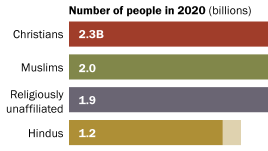
Many Religious ‘Nones’ Around the World Hold Spiritual Beliefs
Despite their nonreligious identity, many unaffiliated adults hold spiritual or religious beliefs. About a fifth or more in 22 countries believe in an afterlife, for example.
Numbers, Facts and Trends Shaping Your World
Despite their nonreligious identity, many unaffiliated adults hold spiritual or religious beliefs. About a fifth or more in 22 countries believe in an afterlife, for example.
All
Publications
No religious group in the United States has released an official statement on radical life extension. However, here are brief summaries of how some clergy, bioethicists and other scholars from 18 major American religious groups say their traditions might approach this evolving issue.
As young Catholics gather in Brazil, awaiting Pope Francis’ visit in celebration of World Youth Day, an analysis of census data finds that the share of Brazil’s population that identifies as Catholic has been dropping steadily in recent decades. Over the same period, the percentage of Brazilians who belong to Protestant churches has been rising.
Christians remain the largest religious group, and Muslims grew the fastest from 2010 to 2020. Read how the global share of Buddhists, Hindus, Jews and the religiously unaffiliated changed.
Most who use astrology (or a horoscope), tarot cards or a fortune teller say they do so just for fun rather than for insights about life.
After years of decline, the U.S. Christian share now shows signs of leveling off. The new Religious Landscape Study explores trends in identity, beliefs and practices.
The Global Religious Futures (GRF) project is jointly funded by The Pew Charitable Trusts and The John Templeton Foundation. Here are some big-picture findings from the GRF, together with context from other Pew Research Center studies.




